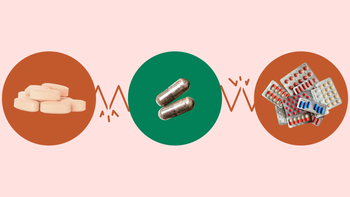
Can You Overdose on Calcium?
Key takeaways:
Calcium is the most abundant mineral in your body. It has several important roles, like keeping your bones strong and sending signals for muscle movement.
Most people get calcium from their diet. But some people also take calcium supplements. Although rare, it’s possible to take too much — leading to high calcium levels in the blood.
Contact Poison Control at 1-800-222-1222 if you think you’ve taken too much calcium. If you’re experiencing symptoms of high calcium levels, contact your healthcare provider. Get immediate medical attention if your symptoms are severe.
When you’re experiencing heartburn, you might reach for a calcium-containing antacid, like Tums or Rolaids, for relief. Or, perhaps you’re taking calcium supplements because you don’t get enough from your diet. While these products may seem relatively safe, it’s possible to take too much calcium. But how much is too much?
For most adults, experts recommend staying below 2,000 mg to 2,500 mg of calcium each day, depending on your age. This includes calcium from your diet and supplements. Most people get enough calcium from their diet. But for others, supplements can help bridge the gap.
Sometimes, taking too much calcium can cause your calcium levels to get higher than normal. And it may not be obvious that it’s happening.
Search and compare options
What types of calcium supplements are available?
You can find a variety of over-the-counter (OTC) calcium supplements in pharmacies and grocery stores. The most common forms include calcium carbonate and calcium citrate. Others include calcium gluconate and calcium lactate.
Calcium supplements are typically taken by mouth in the form of tablets, chewable tablets, or capsules. But not all calcium supplements are created equal. Each of these forms contain different amounts of calcium, with calcium carbonate containing the most.
You can also find calcium in multivitamins and some combination products, usually with vitamin D. Common OTC antacids, like Tums and Rolaids, contain calcium carbonate.
What does calcium do for the body?
Your body uses calcium for many different functions. We commonly think of it as being necessary for keeping our bones and teeth healthy. In fact, about 99% of your body’s calcium is stored in your bones and teeth. This helps keep them strong and hard.
But your body also uses calcium for other purposes. Your muscles use calcium to move and contract. Your nerves use calcium to send signals between your brain and other parts of your body. It’s also important for blood flow and releasing certain hormones in your body.
What foods and drinks contain calcium?
Calcium is found in many different foods. Most people can get the calcium they need from eating calcium-rich foods. This includes the following:
Dairy products, like milk, cheese, and yogurt
Vegetables, like spinach and kale
Fish with soft, edible bones, like sardines
Drinks (like juices or soy milk) or foods that have calcium added to them
Read more like this
Explore these related articles, suggested for readers like you.
Food and drink items will usually have the amount of calcium listed on their nutrition facts label. This can help tell you how much calcium is in each serving.
How much calcium is safe to take?
Staying within the recommended daily amounts of calcium is usually safe. This is the amount of daily calcium needed by most healthy people.
However, your healthcare provider may have different recommendations for you. That’s because certain health conditions, medications, and other factors can affect how much calcium is safe to take.
Keep in mind: These totals include calcium from diet and supplements. If you’re not getting enough calcium from your diet, supplements can help make up the difference.
Your body is only able to absorb a certain amount of calcium from supplements at a time. You’ll typically absorb the most calcium from doses of 500 mg or less. So, you may need to divide your daily amount into smaller doses taken twice daily.
|
Age |
Recommended daily amount |
|
Babies up to 6 months |
200 mg |
|
Infants ages 7 to 12 months |
260 mg |
|
Children ages 1 to 3 years |
700 mg |
|
Children ages 4 to 8 years |
1,000 mg |
|
Children and adolescents ages 9 to 18 years |
1,300 mg |
|
Adults ages 19 to 50 years |
1,000 mg |
|
Adult men ages 51 to 70 years |
1,000 mg |
|
Adult women ages 51 to 70 years |
1,200 mg |
|
Adults ages 71 and older |
1,200 mg |
How much calcium is too much?
In addition to recommended daily intake amounts, there are also maximum amounts you are able to take (called tolerable upper intake levels). Taking more than the maximum amount may lead to side effects and other health risks.
|
Age |
Maximum daily amount |
|
Babies up to 6 months |
1,000 mg |
|
Infants ages 7 to 12 months |
1,500 mg |
|
Children ages 1 to 3 years |
2,500 mg |
|
Children ages 4 to 8 years |
2,500 mg |
|
Children and adolescents ages 9 to 18 years |
3,000 mg |
|
Adults ages 19 to 50 years |
2,500 mg |
|
Adults ages 51 to 70 years |
2,000 mg |
If you have certain medical conditions, the maximum amount may be different. For example, people with chronic kidney disease (CKD) can have imbalances in minerals like calcium and phosphorus. And so too much calcium can cause problems in your heart, blood vessels, and bones.
The National Kidney Foundation recommends limiting calcium to less than 2,000 mg per day in people with CKD. This includes calcium from your diet, supplements, and other medications.
What medications and supplements should I be careful to mix calcium supplements with?
When taken at the same time, calcium can affect the absorption of certain medications. Most commonly, these include certain antibiotics, thyroid medications, and osteoporosis medications.
But there are also some medications and supplements known to increase calcium levels. And when combined with calcium supplements, your calcium levels may get too high. Examples of these include:
Lithium (Lithobid)
Thiazide diuretics, like hydrochlorothiazide (Microzide)
Vitamin D supplements
Teriparatide (Forteo)
Make sure your healthcare provider has your current medication list. They can check for potential interactions with your calcium supplements.
How can you tell if you’ve taken too much calcium?
Hypercalcemia occurs when your calcium levels are higher than normal. It’s usually caused by an overactive parathyroid gland or cancer. Less commonly, this can happen from taking too much calcium. But this may be more likely if you’re combining it with other medications or supplements that increase calcium levels.
Milk-alkali syndrome is a related condition that can cause hypercalcemia. And it’s usually caused by taking too many calcium supplements. This is when high calcium levels shift your blood’s acid/base balance. This can affect how well your kidneys function.
You might not notice that your calcium levels are too high until you develop symptoms. But high calcium levels can affect different parts of your body, causing symptoms like:
Digestive system: constipation, stomach pain, and nausea/vomiting
Kidneys: increased thirst and urination
Brain: mood changes, disorientation, and confusion
Bones and muscles: bone pain, muscle weakness, and fatigue
Hypercalcemia can also lead to other problems, like pancreatitis, heart rhythm problems, and peptic ulcer disease. Kidney stones are also possible, but this is less likely to happen from calcium supplements.
Let your healthcare provider know if you’re experiencing these symptoms while taking a calcium supplement, including antacids like Tums.
What should I do if I accidentally take too much calcium?
If you’re concerned that you or a loved one took too much calcium, contact Poison Control at 1-800-222-1222. They can provide recommendations based on how much calcium you took. If you’re experiencing symptoms of high calcium levels, contact your healthcare provider right away.
That being said, make sure to listen to your body. If your symptoms are severe, go to your nearest emergency care center instead. This is especially important if you are experiencing:
Repeated vomiting
A significant decrease in urination, or dark brown urine
Disorientation, confusion, or lethargy
Severe hypercalcemia symptoms typically require treatment in a hospital.
The bottom line
Calcium is an important mineral involved in many different functions in your body. And while most people get enough calcium from their diet, some need to take calcium supplements to make up the difference.
Staying within the recommended intake amounts of calcium is generally safe. But it’s possible to get too much calcium from supplements. This can cause calcium levels in your blood to get too high. And this may be more likely if you’re taking other medications or supplements that increase calcium levels, too.
Follow your healthcare provider instructions for taking calcium supplements. And let them know if you develop symptoms of high calcium levels while taking it. They can advise you on next steps. If your symptoms are severe, get immediate medical attention.
Why trust our experts?



References
Amberg, G. C., et al. (2013). Calcium dynamics in vascular smooth muscle. Microcirculation.
Brini, M., et al. (2014). Neuronal calcium signaling: Function and dysfunction. Cellular and Molecular Life Sciences.
Dietary Guidelines for Americans. (2019). Food sources of calcium.
Goltzman, D., et al. (2018). Physiology of the calcium-parathyroid hormone-vitamin D axis. Frontiers of Hormone Research.
Kuo, I. Y., et al. (2015). Signaling in muscle contraction. Cold Spring Harbor Perspectives in Biology.
MedlinePlus. (2021). Calcium.
MedlinePlus. (2021). Milk-alkali syndrome.
National Capital Poison Center. (n.d.). Get poison control help.
National Institutes of Diabetes and Digestive and Kidney Diseases. (2021). Mineral and bone disorder in chronic kidney disease.
National Institutes of Health Office of Dietary Supplements. (2022). Calcium.
National Kidney Foundation. (2003). KDOQI clinical practice guidelines for bone metabolism and disease in chronic kidney disease.
Sadiq, N. M., et al. (2021). Hypercalcemia. StatPearls.
Sorensen, M. D. (2014). Calcium intake and urinary stone disease. Translational Andrology and Urology.





























